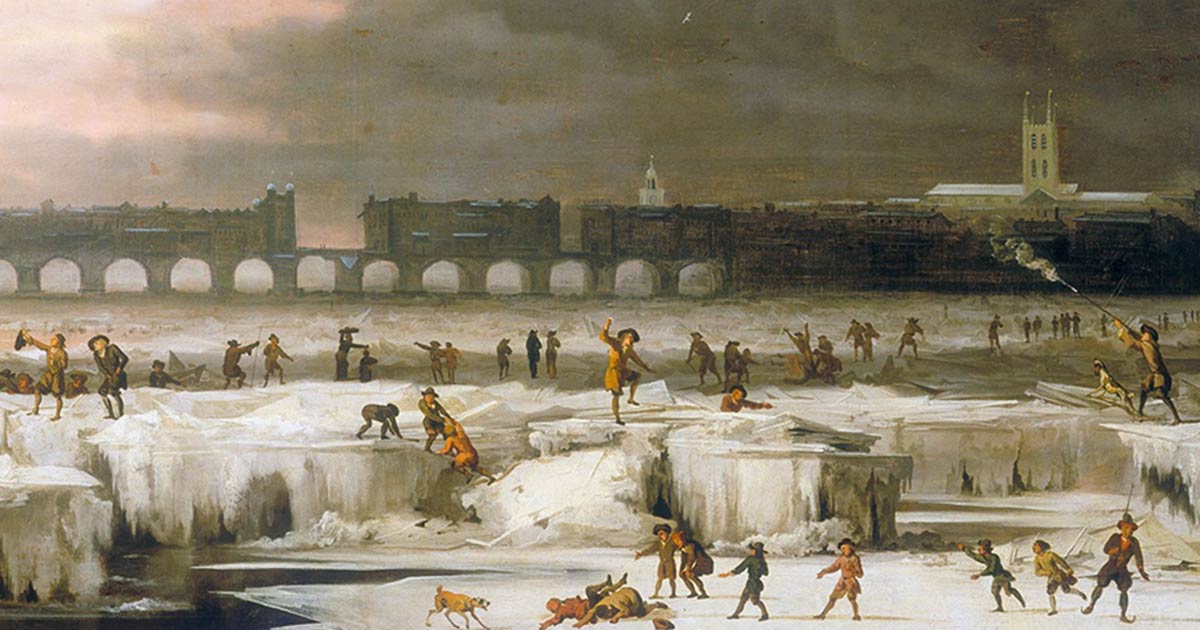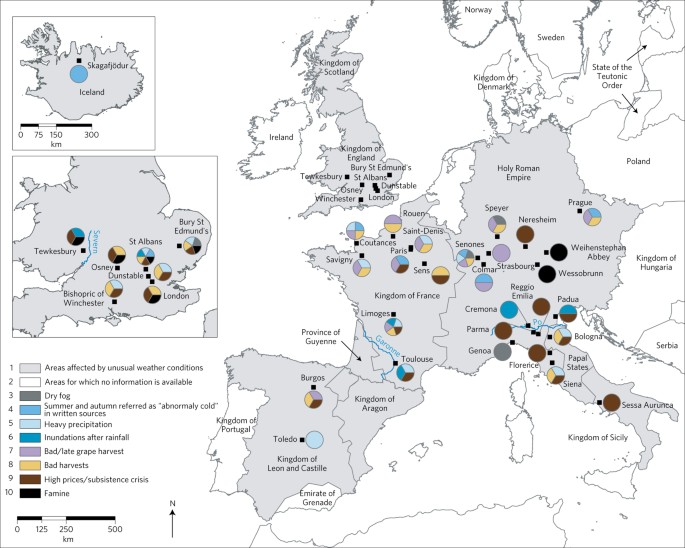The
Little Ice Age (
LIA) was a period of
regional cooling, particularly pronounced in the North Atlantic region.
[2] It
was not a true ice age of global extent.
[3] The term was introduced into scientific literature by
François E. Matthes in 1939.
[4] The period has been conventionally defined as extending from the 16th to the 19th centuries,
[5][6][7] but some experts prefer an alternative timespan from about 1300
[8] to about 1850.
[9][10][11] -
Little Ice Age - Wikipedia
References[edit]
- ^ Hawkins, Ed (30 January 2020). "2019 years". climate-lab-book.ac.uk. Archived from the original on 2 February 2020. ("The data show that the modern period is very different to what occurred in the past. The often quoted Medieval Warm Period and Little Ice Age are real phenomena, but small compared to the recent changes.")
- ^ Ladurie, Emmanuel Le Roy (1971). Times of Feast, Times of Famine: a History of Climate Since the Year 1000. Barbara Bray. Garden City, NY: Doubleday. ISBN 978-0-374-52122-6. OCLC 164590.
- ^ Jump up to:a b c "Climate Change 2001: The Scientific Basis". UNEP/GRID-Arendal. Archived from the original on 29 May 2006. Retrieved 2 August 2007.
- ^ Matthes, François E. (1939). "Report of Committee on Glaciers, April 1939". Transactions, American Geophysical Union. 20 (4): 518. Bibcode:1939TrAGU..20..518M. doi:10.1029/TR020i004p00518. Matthes described glaciers in the Sierra Nevada of California that he believed could not have survived the hypsithermal; his usage of "Little Ice Age" has been superseded by "Neoglaciation".
- ^ Jump up to:a b Mann, Michael (2003). "Little Ice Age" (PDF). In Michael C MacCracken; John S Perry (eds.). Encyclopedia of Global Environmental Change, Volume 1, The Earth System: Physical and Chemical Dimensions of Global Environmental Change. John Wiley & Sons. Archived (PDF) from the original on 9 October 2022. Retrieved 17 November 2012.
- ^ Lamb, HH (1972). "The cold Little Ice Age climate of about 1550 to 1800". Climate: present, past and future. London: Methuen. p. 107. CiteSeerX 10.1.1.408.1689. ISBN 978-0-416-11530-7. (noted in Grove 2004:4).
- ^ Jump up to:a b "Earth observatory Glossary L-N". NASA Goddard Space Flight Center, Green Belt MD: NASA. Retrieved 17 July 2015.
- ^ Jump up to:a b c d e Miller, Gifford H.; Geirsdóttir, Áslaug; Zhong, Yafang; Larsen, Darren J.; Otto-Bliesner, Bette L.; Holland, Marika M.; Bailey, David A.; Refsnider, Kurt A.; Lehman, Scott J.; Southon, John R.; Anderson, Chance; Björnsson, Helgi; Thordarson, Thorvaldur (30 January 2012). "Abrupt onset of the Little Ice Age triggered by volcanism and sustained by sea-ice/ocean feedbacks". Geophysical Research Letters. 39 (2): n/a. Bibcode:2012GeoRL..39.2708M. CiteSeerX 10.1.1.639.9076. doi:10.1029/2011GL050168. S2CID 15313398.
- ^ Grove, J.M., Little Ice Ages: Ancient and Modern, Routledge, London (2 volumes) 2004.
- ^ Matthews, John A.; Briffa, Keith R. (2005). "The 'little ice age': Re‐evaluation of an evolving concept". Geografiska Annaler: Series A, Physical Geography. 87: 17–36. doi:10.1111/j.0435-3676.2005.00242.x. S2CID 4832081.
- ^ "1.4.3 Solar Variability and the Total Solar Irradiance – AR4 WGI Chapter 1: Historical Overview of Climate Change Science". Ipcc.ch. Retrieved 24 June 2013.
- ^ Jump up to:a b
Extract from Plimer
"The Little Ice Age was not really an ice age. In reality, it was a cool interval within the current interglacial. What made the Little Ice Age particularly difficult was that there had been hundreds of years of warmth in the Medieval Warming and the increased population was supported by subsistence farming. Subsistence farming was later replaced in Britain by specialist farming to support city populations. The Northern Hemisphere had adapted to warm times and was not prepared for the sudden onset of cold times. This created an environmental catastrophe. There was massive depopulation.
This catastrophe was global. Pacific Island populations were greatly reduced at the beginning of the Little Ice Age.300 Other parts of the world were cold and dry, especially during the Spörer and Maunder Minima.
301 Not only was it cold during the Little Ice Age, but there were rapid fluctuations in temperature and precipitation. During the Maunder Minimum, a year of record cold temperatures (1683–1684) was followed by a year of record heat (1685–1686). Change to glacial climate is characterised by drastic changes in temperature, storminess and precipitation without warming. These changes were local, global and rapid. They had a profound effect on human society.
302"
Effects of the Little Ice Age in the Pacific Islands and Hawaii
In the Pacific Islands, the earliest signs of the Little Ice Age's effects were felt as sea levels decreased between 1270 and 1475, caused by a a drop in temperatures. Further information from the analysis of
coral reef records revealed that intensified fluctuating heating sea temperatures, known as El-Nino Southern Oscillations, reached its extremes sometime in the mid-seventeenth century.
There has been a longstanding debate amongst scholars and archaeologists in Hawaii, as they attempt to discover when and why its statehood came about. Some suggest that the Little Ice Age did in fact have a massive effect on the social politics of its people in the late 15 th century. Von Kirsch has surmised that it may have given rise to Hawaii's transformation from a chiefdom to a state due to shifts in climate and rainfall patterns.
The climatic shift allowed for the expansion of agricultural production. With the fruitful fertility brought about by the fluctuation of warm and dry weather followed by long heavy rains, it may have provided an ample excess of food which allowed Hawaiian society further develop specification among its crafts, trades, food, and culture. This in turn, argues Von Kirsch, led to the rise of its states and its firm organizational structure and governmental systems that remained intact until 1893.
The Little Ice Age is a period tentatively defined as running from the 14th to the 19th century in which the northern hemisphere of Earth endured a limited but substantial cooling period. Now please be forewarned, the Little Ice Age (LIA) should not be confused with the Medieval Warm Period, or...

www.ancient-origins.net
The climatic response to the 1257 Samalas eruption is unclear. Analyses of proxy data and medieval archives suggest that the eruption triggered some of the coldest summers of the past millennium, but only in some Northern Hemisphere regions.

www.nature.com
Ricardo, Villalba. 1994. "Tree-ring and glacial evidence for the medieval warm epoch and the little ice age in Southern South America." In
Climatic change (Springer Science and Business Media LLC) 26 (2-3): 183-197.
Russel, J.M., and T.C Johnson. 2007. "Little Ice Age drought in equatorial Africa: Intertropical Convergence Zone migrations and El Nino - Southern Oscillation Variability."
Geological Society of America (Geology) 35 (1): 21-24.
Von Kirch, Patrick. 2012.
A Shark Going Inland Is My Chief The island civilization of Ancient Hawai'i . Los Angeles: University of California Press.


